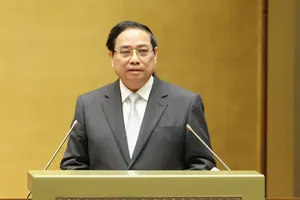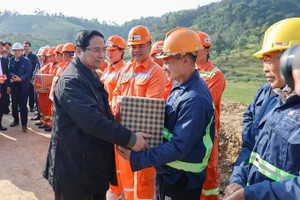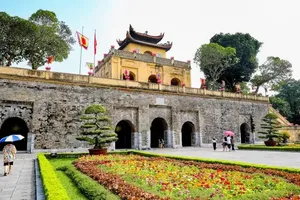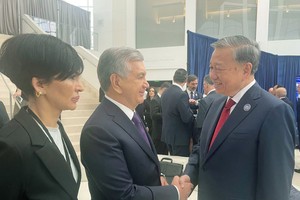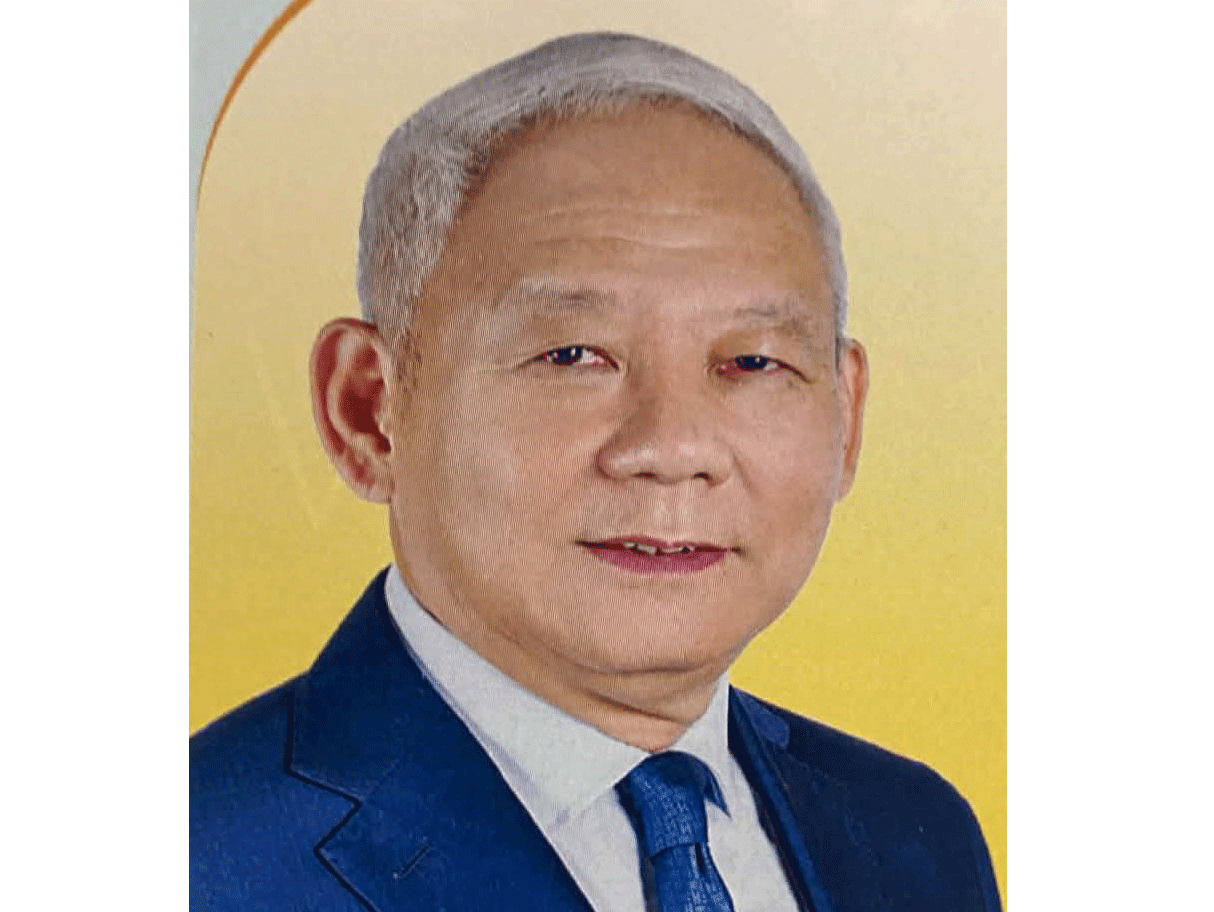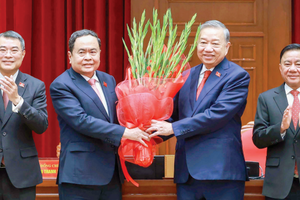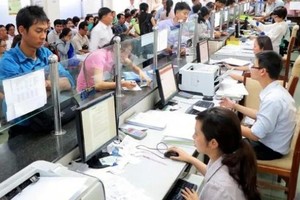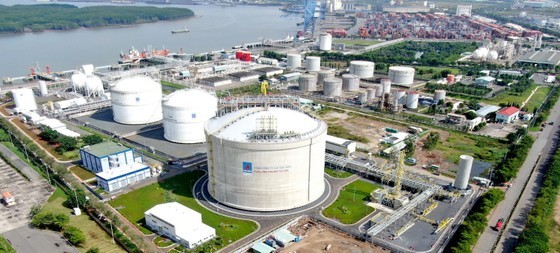 |
LNG gas is waiting for price bracketing |
In recent years, the world demand for LNG has increased rapidly with a rate of 6.3 percent per year, and the regasification capacity for liquefied natural gas worldwide has also increased from 340 million tons in 2017 to 453 million tons in 2022.
In Vietnam, according to the National Electricity Development Plan to 2030 with a vision to 2045 (or the Power Plan VIII), gas thermal power sources will account for 24.8 percent of the total capacity of the entire system by 2030 - accounts for the largest proportion in the power source structure while coal thermal power, hydropower, onshore and offshore wind power only account for 20 percent, 19.5 percent and 18.5 percent respectively.
In the structure of gas thermal power sources, LNG thermal power alone accounts for 14.9 percent. At the same time, the Politburo’s Resolution No. 55-NQ/TW dated February 11, 2020 on the strategic orientation of Vietnam's national energy development to 2030, with a vision to 2045 also requires rapid development of LNG thermal power plant with priority given to developing LNG import and distribution infrastructure.
However, currently, the implementation of this policy is facing some hiccups along the way that need to be promptly resolved. In particular, the first obstacle is the negotiation of electricity prices and annual electricity output consumption.
Up to now, roughly 13 LNG gas power projects have been approved for investment. Of these, five projects are being implemented while four other projects have found investors, and localities are responsible for seeking investors for four other projects.
Among these projects, the Nhon Trach 3 and 4 gas power projects in Dong Nai Province’s Nhon Trach District, are considered national key projects under Power Planning VIII, assigned by the Government to PetroVietnam Power Corporation (PV Power) investor with a capacity scale of 1,500MW and a total investment of US$1.4 billion.
This is the first LNG power project in Vietnam, expected to be put into operation from 2024-2025. According to Mr. Nguyen Duy Giang, Deputy General Director of PV Power, currently the biggest difficulty when implementing the Nhon Trach 3 and 4 LNG projects is negotiating the power purchase agreement (PPA) between PV Power and Vietnam Electricity Group (EVN).
Though the two parties have spent two years negotiating over the price, the signing has still not been possible due to the commitment to the total annual electricity output purchased from EVN. According to PV Power's proposal, the annual electricity output required is 90 percent and the application period is 15 years from the time the plant operates commercially to match the project's loan repayment time; however, the electricity buyer said that this is unprecedented; so it must seek approval from competent authorities.
At the meeting with the Ministry of Industry and Trade, Thai Thanh Phong, Deputy Director of the Department of Industry and Trade of Dong Nai province, also said that the two LNG power plants Nhon Trach 3 and 4 are expected to generate commercial electricity through unit 1 in 2024 and 2025, but is facing difficulties because EVN has not agreed with the investor on electricity purchase and sale prices. Not only Nhon Trach 3 and 4 LNG gas power projects but other LNG gas power projects such as LNG Hiep Phuoc in HCMC, Son My I and Son My II in Binh Thuan Province, LNG in Quang Ninh Province, LNG in Bac Lieu Province are also facing difficulties in electricity purchase contracts.
Many experts are also concerned that because according to Power Plan VIII, by 2030, LNG thermal power plants need a total capacity of 22,400 MW accounting for 14.9 percent of the total source, so just seven more years for LNG projects have been carried out and operated. Experts fretted the country would fail to achieve its goals.
According to Associate Professor Ngo Tri Long, former head of the Ministry of Finance (MoF)'s Price Research Institute, LNG gas power projects that are supplemented to the planning must participate in the electricity market. But there is currently no regulation that the electricity buyer must underwrite electricity output. Mr. Ngo Tri Long said that the negotiation of the electricity purchase price in the electricity purchase contract must comply with regulations on the basis of calculating annual sales output, cash flow, and investment costs.
Currently, about half of LNG gas power projects have not yet started construction and are behind schedule because negotiations related to power purchase contracts have not been completed. Besides, with the power source structure in Power Plan VIII, the Ministry of Industry and Trade calculates that a 10 percent increase in LNG prices will increase the system's average power production cost by 1.1-1.5 percent. The biggest challenge of LNG power plants is still high cost, input materials for electricity production depend on imported prices. Therefore, plants need to be run at base load to have better and more acceptable prices. However, according to Associate Professor Ngo Tri Long, there is currently no electricity generation price frame for LNG gas power projects, so it is not known how much is reasonable to negotiate. The purchase price of electricity from an LNG power source will be much higher than the retail price of electricity that EVN sells to the economy. EVN's financial supervision agencies find it difficult to accept, so EVN cannot decide whether to this sale," Mr. Ngo Tri Long acknowledged.
Mr. Nguyen Anh Tuan, former Director of the Renewable Energy Center under the Ministry of Industry and Trade, assessed that LNG gas power projects are currently stagnant pointing out that the selling price to EVN is higher than the average retail electricity that EVN sells in the market.
The Ministry of Industry and Trade has not yet issued the electricity generation price framework for LNG power plants which makes investors worry about the effectiveness of the projects despite EVN’s commitment to purchase annual electricity output and consumption of all gas. For electrification to reach its destination in accordance with the planning, the State must provide an electricity price framework for the parties to negotiate and sign an electricity purchase contract, from which they can plan to build the plant and pour investment into their plants.
To avoid the risk of schedule delays, Mr. Nguyen Duy Giang, Deputy General Director of PV Power, said that the Government should soon issue a power generation price framework for LNG gas power projects. He added that in the current context, without a Government’s commitment to power consumption, power producers will not implement projects on schedule.


